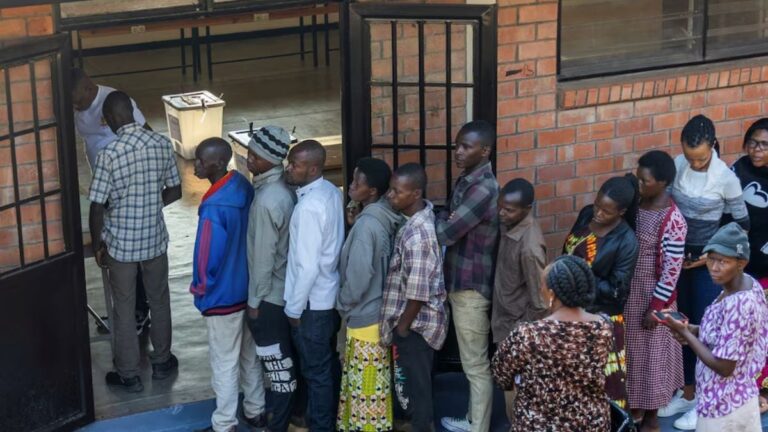Voters queue before casting their ballots at a polling station during the 2024 presidential election in Kigali, Rwanda, on July 15, 2024. REUTERS
Rwandans voted in a presidential election on Monday with an overwhelming turnout that put incumbent Paul Kagame firmly in the lead, with early results indicating that he will be given a fourth term, marking nearly 25 years of rule over the East African country.
The National Electoral Commission reported a 98 percent turnout out of 9 million registered voters. By Monday evening, 78.94 percent of the votes had been counted, according to commission data, giving Mr Kagame a commanding lead with 99.15 percent of the vote.
Kagame, who became de facto leader after the 1994 genocide ended and has been officially president since 2000, was confirmed to have won by the National Electoral Commission, which announced he had received 99.15 percent of the vote after 79 percent of the votes were counted. Democratic Green Party candidate Frank Habineza and independent Philippe Mpaimana received 0.53 percent and 0.32 percent of the vote, respectively.
“I’m happy that the voting went smoothly and without any crowds,” local resident Phenias told Reuters. “I voted for Paul Kagame because he has done a lot for us and he has united us.”
Praise and support for Kagame
President Kagame, who has won more than 93% of the vote in the last three elections, has been praised by Western and regional leaders for ending the 1994 genocide. The U.S. State Department and other international organizations have praised his economic policies for stimulating a remarkable recovery. According to the World Bank, Rwanda’s GDP grew an average of 7.2% annually from 2012 to 2022, but nearly half of the population still lives on less than $2.15 a day.
“This is my first time voting and I’ve never seen a leader like President Kagame so I’m voting for him,” motorbike driver Jean-Claude Nkurunziza told The Associated Press.
Allegations of silencing opposition
Despite high voter turnout and clear popular support, the election has been marked by allegations of media suppression and political repression, with critics accusing Kagame’s government of silencing dissent and barring several prominent opponents from running.
Campaigners such as Human Rights Watch have accused authorities of cracking down on journalists, opposition figures and civil society groups ahead of the vote, and Amnesty International has reported that Rwanda’s opposition faces severe restrictions, including intimidation, arbitrary detention, prosecution and enforced disappearances.
Kagame has denied the accusations and cast himself as the candidate of stability, but the National Electoral Commission disqualified eight other candidates, including some of his fiercest critics, citing incomplete registration documents and other issues.
Unbalanced campaigns
The disparity between the candidates was stark during the three-week election. The ruling Rwanda Patriotic Front’s (RPF) well-organized public relations campaign contrasted with the struggles of Kagame’s opponents, whose rallies drew fewer than 100 people. RPF colors and slogans such as “Tora Kagame Paul” (“Vote for Paul Kagame”) and “PK24” (“Paul Kagame 2024”) were ubiquitous.
The final results are expected to be announced by July 27, but may be released earlier.
Information provided by the institution
Find us on YouTube
subscribe

